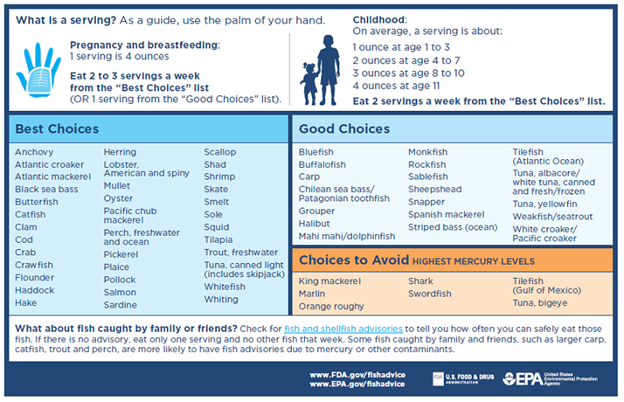Dietary Advice Before and During Pregnancy
Food Safety for Moms-To-Be Main Page
Nutritionists recommend that everyone consume a balanced diet, including:
- A variety of vegetables from all the subgroups—dark green, red and orange, legumes (beans and peas), starchy, and other
- Fruits, especially whole fruits
- Fat-free or low-fat dairy, including milk, yogurt, cheese, and or fortified soy beverages
- A variety of protein foods, including seafood, lean meats and poultry, eggs, legumes (beans and peas) and nuts, seeds, and soy products
- Oils
- Grains, at least half of which are whole
In addition to the information above, if you are or might become pregnant, you can find information to help you make informed food choices in the Dietary Guidelines for Americans.
This page includes more resources about folic acid and eating fish and grains for your developing baby’s health.
On this page:
- Consume Folic Acid Before and During Pregnancy
- Follow Our Advice About Eating Fish
- Eat a Variety of Grains
Consume Folic Acid Before and During Pregnancy
Hispanic women/Latinas face unique challenges when trying to meet folic acid recommendations and are more likely to have a child born with a neural tube defect than non-Hispanic White and Black women. To address this health disparity and help others who eat foods made with corn masa flour get the recommended daily value of folic acid, the FDA is encouraging food manufacturers to add folic acid to corn masa flour.
Folic acid is a B vitamin and essential nutrient that helps prevent some serious birth defects, such as neural tube defects, when taken before and during pregnancy. The neural tube begins developing into an unborn baby’s spinal cord and brain during the first month of pregnancy, when a woman might not even know they are pregnant. Neural tube defects are birth defects of the brain, spine, and spinal cord, such as anencephaly and spina bifida.
If you are or may become pregnant, you should consume 400 micrograms of folic acid daily. You can get folic acid from dietary supplements or foods fortified with folic acid.
Folic acid is sometimes added to staple foods to help people meet their daily needs, including:
- Enriched breads, pasta, rice, and breakfast cereals
- Fortified corn masa flour (an ingredient used to make foods such as tortillas, tamales, arepas, pupusas, cookies, and sweet rolls)
It’s important to check ingredient lists on products before you buy them to make sure they contain folic acid.
Follow Our Advice About Eating Fish
Fish are part of a healthy diet and provide key nutrients during pregnancy, breastfeeding, and/or early childhood that support a child’s brain development. Eating fish may provide heart health benefits too.
The FDA and Environmental Protection Agency’s (EPA) advice can help those who might become or are pregnant or breastfeeding as well as parents and caregivers make informed choices when it comes to the types of fish that are nutritious and safe to eat. This advice supports the recommendations of the Dietary Guidelines for Americans.
Eat a Variety of Grains
If you are or might become pregnant you should consume a variety of foods, including whole grains such as wheat, oats, and barley for good nutrition. In addition to vegetables and fruits, grains are some of the important sources of many nutrients, including vitamins, minerals, and dietary fiber that help support a healthy pregnancy.
Examples of whole grains include:
- Amaranth,
- Barley (not pearled)
- Brown rice
- Buckwheat
- Bulgur
- Millet
- Oats
- Popcorn
- Quinoa
- Dark rye
- Wheat
- Whole-grain cornmeal
- Whole-wheat bread
- Whole-wheat chapati
- Whole-grain cereals and crackers
- Wild rice
Rice, which is a major global food source, is also a leading dietary source of arsenic that may have developmental effects on infants and lead to adverse pregnancy outcomes. The FDA monitors and regulates levels of arsenic in foods and takes action if the agency finds that the level of arsenic causes a food to be unsafe. For more information, see Arsenic in Food.
By eating a variety of grains during pregnancy, you can promote better health for your baby.



